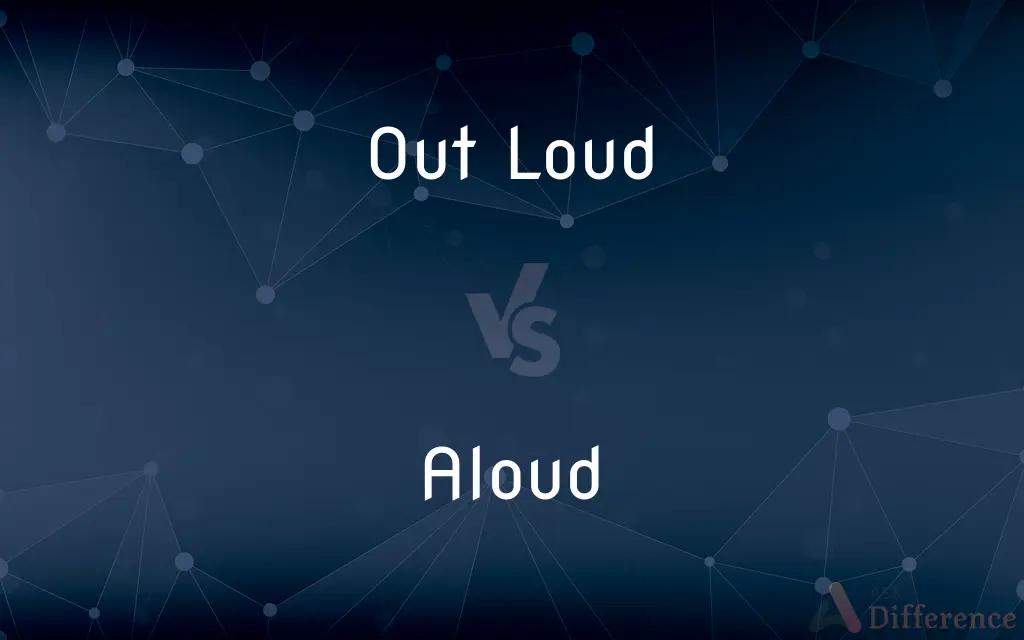Out Loud vs. Aloud — What's the Difference?
By Tayyaba Rehman — Published on November 12, 2023
Out Loud and Aloud both mean audibly, not silently. However, "Out Loud" emphasizes the act of speaking, while "Aloud" can be more formal.

Difference Between Out Loud and Aloud
Table of Contents
ADVERTISEMENT
Key Differences
Out Loud and Aloud are terms often used interchangeably, but they have subtle distinctions. Out Loud carries an emphasis on the action of vocalizing thoughts, feelings, or reactions, often spontaneously. It implies that something typically kept internalized is given voice. Aloud, on the other hand, is more straightforward, simply meaning to say something audibly rather than in silence.
The phrase Out Loud is often used in everyday conversations and casual contexts. For instance, when someone finds something amusing and inadvertently chuckles, they might say they laughed "Out Loud." Aloud tends to be found in more structured or formal situations, especially in literary contexts or when referring to reading material audibly.
Both terms, Out Loud and Aloud, underscore the difference between vocalizing and remaining silent. However, Out Loud has a nuance of being somewhat unintentional or surprising. Aloud lacks this connotation, focusing merely on the act of audible expression.
Grammatically speaking, Out Loud is a compound adverb, while Aloud is a single-word adverb. Both can modify verbs, showing how the action is performed. For instance, "She read the letter Out Loud" and "He recited the poem Aloud" illustrate their functional similarity.
In essence, while Out Loud and Aloud can often be used interchangeably, they have distinct connotations and preferred contexts. Out Loud leans towards spontaneous vocal reactions, while Aloud is more general and can be formal.
ADVERTISEMENT
Comparison Chart
Meaning
Audibly, often spontaneously
Audibly
Context
Casual
Formal or general
Connotation
Emphasis on action
Simply audible
Grammatical Form
Compound adverb
Single-word adverb
Common Usage
Laughed Out Loud
Read Aloud
Compare with Definitions
Out Loud
Out Loud means to vocalize thoughts or feelings audibly.
She expressed her concerns Out Loud.
Aloud
Aloud refers to the act of speaking or reading audibly.
He read the instructions Aloud for everyone.
Out Loud
To articulate without silence or internal restraint.
I often think Out Loud when brainstorming.
Aloud
Contrary to silent, it indicates audible vocalization.
The class read the text Aloud together.
Out Loud
An indication of something usually silent becoming audible.
Sometimes, I just need to cry Out Loud.
Aloud
Simply put, the opposite of silently.
He whispered Aloud, ensuring she heard him.
Out Loud
A term highlighting the break from silence.
He voiced his opinion Out Loud, surprising everyone.
Aloud
To express in a manner that others can hear.
She sang Aloud, filling the room with music.
Out Loud
A way to emphasize the audible expression of something.
He found it so funny that he laughed Out Loud.
Aloud
A term often used in literary contexts for vocal expression.
Authors sometimes read their books Aloud at events.
Out Loud
Alternative form of out loud
Aloud
With use of the voice; orally
Read this passage aloud.
Aloud
In a loud tone; loudly
Crying aloud for help.
Aloud
With a loud voice, or great noise; loudly; audibly.
Try speaking aloud rather than whispering.
Aloud
Audibly, as opposed to silently/quietly.
Speaking aloud rather than thinking thoughts privately
Aloud
Spoken out loud.
Aloud
With a loud voice, or great noise; loudly; audibly.
Cry aloud, spare not, lift up thy voice.
Aloud
Using the voice; not silently;
Please read the passage aloud
He laughed out loud
Aloud
With relatively high volume;
The band played loudly
She spoke loudly and angrily
He spoke loud enough for those at the back of the room to hear him
Cried aloud for help
Common Curiosities
Can I say "I laughed Aloud"?
Yes, but "I laughed Out Loud" is more common for spontaneous reactions.
Why would someone choose to use Out Loud over Aloud?
Out Loud often emphasizes an unexpected or unintentional audible reaction.
Are Out Loud and Aloud interchangeable?
Often yes, but Out Loud emphasizes spontaneous vocalization while Aloud is more general.
Is reading Out Loud beneficial for comprehension?
Yes, reading either Out Loud or Aloud can enhance understanding.
Is Aloud more formal than Out Loud?
Yes, Aloud is typically used in more formal or literary contexts.
Are both terms adverbs?
Yes, both Out Loud and Aloud function as adverbs modifying verbs.
Is it "think Out Loud" or "think Aloud"?
Both are correct, but "think Out Loud" emphasizes spontaneous vocalization of thoughts.
Do Aloud and Out Loud have the same origin?
Both have roots in Old and Middle English related to audible expressions.
Is Out Loud a newer phrase than Aloud?
Out Loud is more colloquial and might be perceived as newer, but both have historical usage.
Can Aloud be used in formal writing?
Yes, Aloud is suitable for formal contexts.
Is "She cried Out Loud" correct?
Yes, it emphasizes that she audibly expressed her emotions.
What's the opposite of speaking Aloud?
The opposite would be speaking silently or internally.
Can Aloud refer to any sound made audibly?
Typically, Aloud refers to vocalization, but it can imply any sound made to be heard.
How do I decide between using Out Loud or Aloud?
Consider context; use Out Loud for emphasis on action and Aloud for general audible expression.
Can Out Loud be used in writing?
Yes, especially in dialogue or to convey character reactions.
Share Your Discovery

Previous Comparison
Vitamin C vs. Ester C
Next Comparison
English Bulldog vs. American BulldogAuthor Spotlight
Written by
Tayyaba RehmanTayyaba Rehman is a distinguished writer, currently serving as a primary contributor to askdifference.com. As a researcher in semantics and etymology, Tayyaba's passion for the complexity of languages and their distinctions has found a perfect home on the platform. Tayyaba delves into the intricacies of language, distinguishing between commonly confused words and phrases, thereby providing clarity for readers worldwide.












































